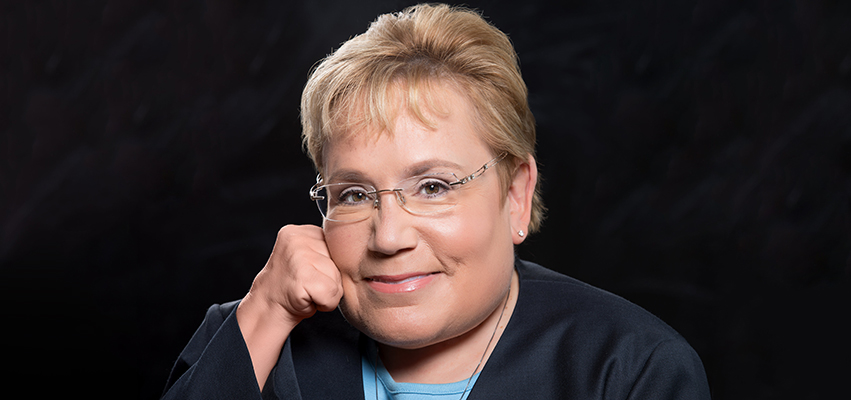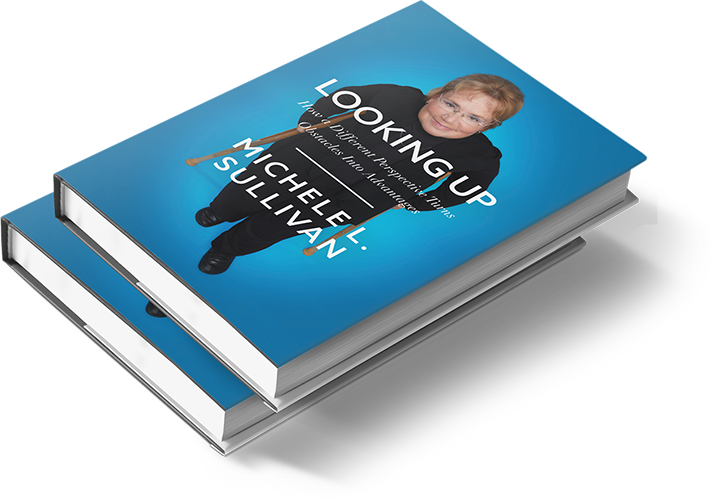
Michele Sullivan is a globally recognized leader and advisor in social impact, a TED speaker and published author. During her 30-year career at Caterpillar, she served as president of the Caterpillar Foundation and director of corporate social innovation at Caterpillar Inc., acquiring global expertise in philanthropy and public-private collaboration.
Among other honors, Sullivan delivered a TED Talk at TEDWomen 2016, becoming the first Caterpillar employee to do so; was named one of the 50 most powerful women in philanthropy by Inside Philanthropy; and served as a delegate to the United Nations Commission on the Status of Women. She earned her MBA from Bradley University.
Sullivan’s first book, Looking Up, will be published by Harper Collins Leadership on February 25, 2020. It traces her passage from a young person born with dwarfism who was looked down upon by others, to her rise to the top of one of the world’s most prominent philanthropic organizations. While her height presented a unique set of challenges, it allowed her to see things that others do not—the basis for her “Looking Up” philosophy. Peoria Magazine sat down with Sullivan to reflect on her journey, the process of writing the book, and the power of acceptance in the face of unique challenges.
 What motivated you to write your first book?
What motivated you to write your first book?
In the years leading up to my retirement, I didn’t view it as a career ending, but an opportunity for another beginning. As I contemplated what the next beginning could be, I kept coming back to sharing my story and some of my lessons learned. My time with the Caterpillar Foundation exposed me to reaching and serving people all around the world. I knew I wanted to continue that mission.
I got started by writing out some of my favorite memories, milestones and experiences. Then I started to write some of my least favorite, but just as (if not more) important. When I put those things in chronological order, the messages within started to come through.
Tell us about your “Looking Up” philosophy and how it developed. What lessons did you learn during your time at Caterpillar?
My philosophy on Looking Up is about embracing the people in our lives for who they truly are, not for the silo in which society has placed them in our mental catalogue. I invite people to slow down, to ask more questions, to listen more than they talk, and to be open to the lessons that every single person can offer them.
Being a little person at the world’s largest earthmoving manufacturer for 30 years taught me quite a lot. My early years taught me to be prepared, to be patient, to listen carefully. As I progressed in my career, I learned that to be an effective leader, I needed to really understand and embrace my team members for their unique skills and approach. Finally, with my time at the Caterpillar Foundation, I learned that monumental and sustainable change in our largest global challenges can only happen through partnerships and collaboration between public, private and nonprofit entities.
How was your time at Caterpillar informed by your early experiences growing up with dwarfism?
Throughout my career, I viewed things from a different perspective—figuratively and literally. Because I have always had to ask for help in my daily life, it never bothered me to do so professionally. Some of the most poignant moments of my career were brought about by simply asking a mentor or colleague for help or for a different perspective.
What changed from your initial vision as you wrote the book? Any surprises along the way?
Many surprises! When reflecting back so deeply on some aspects of my childhood in particular, I found there were several learning moments that I didn’t have the emotional capacity to understand at the time. Now, looking back, I see those moments through a different lens. Honestly, I had been thinking about this book for so long, and it evolved so many times in my mind and in my heart. Once I finally got to write it, it felt very natural.
Having delivered many speeches and presentations over the years, what are some anecdotes or lessons that have been most resonant with your audiences?
When I come on stage, the first thing people notice is my size. I have the challenge of moving my audience past my appearance. I find that with my audiences, illustrating my points with a personal story resonates the most. It has a way of humanizing me as a speaker, which relaxes the audience so they can better digest the messages.
Why do you believe it’s so important to embrace our differences and turn them into assets?
Every single person has value to bring to this world. Learning them, who they truly are, is about understanding their differences. Then you will know their value. I could have lived a very different life based on my difference that you can see—but I chose to embrace it and change my perspective. I am so happy that I did.
What’s next for you? Anything else you wish to add?
The release of Looking Up later this month with Harper Collins Leadership. I look forward to speaking about how everyone should keep Looking Up!
I feel so fortunate to call Peoria home. It is where I was raised, attended Bradley, built my career with Caterpillar, and now it is my home base while I pursue this new dream. I couldn’t be where I am without my family and this community. PM
Visit lookingupbook.com to pre-order the book or for more information.
- Log in to post comments

